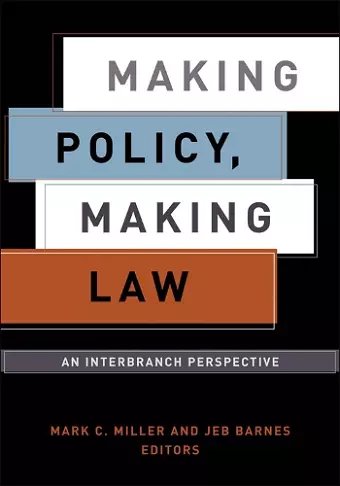Making Policy, Making Law
An Interbranch Perspective
Mark C Miller editor Jeb Barnes editor
Format:Paperback
Publisher:Georgetown University Press
Published:23rd Aug '04
Currently unavailable, and unfortunately no date known when it will be back

The book delivers 'big-time,' providing a perspective that should change how we conceptualize the lawmaking process, altering our perceptions of the role of different levels and branches of government in the process, and providing a provocative argument about why the American lawmaking process differs so greatly from that of other established democracies. It thus will become a 'must read' volume for all who are seriously interested in understanding American lawmaking and the role of our governing institutions in it. -- Lawrence C. Dodd, Manning J. Dauer Eminent Scholar in Political Science, University of Florida Anchored in the 'new institutionalism,' this volume makes a stunning contribution to both political science and legal scholarship. It replaces a tired (and incorrect) civics book notion of separation-of-powers with a more realistic (and accurate) view of policymaking that depends upon dialogue and shared powers among all the branches of government. The wonderfully written essays prepared by an all-star cast of scholars should make this an attractive book for use in any number of different political science, public policy, and law school courses. Indeed, entire courses can be constructed around it. -- Malcolm M. Feeley, Claire Sanders Clements Professor of Law, Boalt Hall School of Law, University of California, Berkeley A major contribution. In this volume a wonderful collection of first-rate scholars treat legislators, executive officials, and judges as part of an integrated and ongoing process of democractic decision making. Miller and Barnes provide a thoughtful and persuasive rationale for their interbranch perspective, and the methodologically diverse essays provide conclusive evidence for the virtues of their approach. Making Policy, Making Law should usher in a new 'governance as dialogue' movement within institutional studies. -- Howard Gillman, professor of political science and law, University of Southern California If the past decade of political science scholarship teaches us anything about courts and judges it is that they cannot be understood in isolation of other institutions. This very valuable volume expands our understanding of how courts and law influence, and are deeply influenced by, policy-making in the other branches. I cannot imagine a reader who would not be stimulated by thinking about the implications of this collection. -- Cornell Clayton, Department of Political Science, Washington State University
Provides a combination of contemporary policy analysis, an interbranch perspective, and diverse methodological approaches that speak to a gap in the literature dealing with the role of the courts in the American policymaking process. This book unravels the interplay of governmental agencies and provides a look at how the US government functions.The functioning of the U.S. government is a bit messier than Americans would like to think. The general understanding of policymaking has Congress making the laws, executive agencies implementing them, and the courts applying the laws as written - as long as those laws are constitutional. "Making Policy, Making Law" fundamentally challenges this conventional wisdom, arguing that no dominant institution - or even a roughly consistent pattern of relationships - exists among the various players in the federal policymaking process. Instead, at different times and under various conditions, all branches play roles not only in making public policy, but in enforcing and legitimizing it as well. This is the first text that looks in depth at this complex interplay of all three branches. The common thread among these diverse patterns is an ongoing dialogue among roughly coequal actors in various branches and levels of government. Those interactions are driven by processes of conflict and persuasion distinctive to specific policy arenas as well as by the ideas, institutional realities, and interests of specific policy communities. Although complex, this fresh examination does not render the policymaking process incomprehensible; rather, it encourages scholars to look beyond the narrow study of individual institutions and reach across disciplinary boundaries to discover recurring patterns of interbranch dialogue that define (and refine) contemporary American policy. "Making Policy, Making Law" provides a combination of contemporary policy analysis, an interbranch perspective, and diverse methodological approaches that speak to a surprisingly overlooked gap in the literature dealing with the role of the courts in the American policymaking process. It will undoubtedly have significant impact on scholarship about national lawmaking, national politics, and constitutional law. For scholars and students in government and law - as well as for concerned citizenry - this book unravels the complicated interplay of governmental agencies and provides a heretofore in-depth look at how the U.S. government functions in reality.
This first-rate collection provides additional and more comprehensive support for a sophisticated, interactive political model of separated powers... Anyone with an interest in American political institutions ought to read this volume. It is chock full of thoughtful and insightful scholarship on a central aspect of American governance. Law & Politics Book Review
ISBN: 9781589010253
Dimensions: unknown
Weight: 454g
256 pages